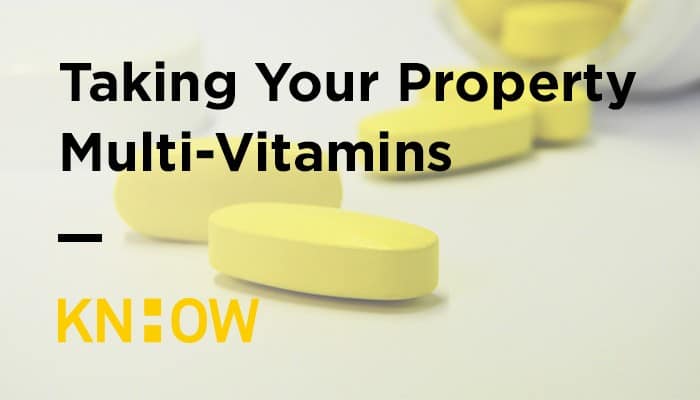The key to investing in property is understanding. Once you have a clear picture of why you’re investing, you can start focusing on how. Fortunately, there are methodologies to ensure that you’ve considered everything you need to, and that you’re making the wisest decision possible. Welcome to my list of ‘Property Multi-Vitamins’ – a simple and easy-to-follow list that will help you to cover all bases in property investment.
The VITAMINS
V = Value
This first one is all about the value of property assets that you’re capable of securing. Ultimately, this is determined by your buy capacity and available equity. The first step to figuring this out is to gain a clear understanding of your property goal by examining your income and liabilities. From there, you can weigh them up against your ideal lifestyle objectives. How big is the gap between where you are now and where you want to be, and what assets do you have that will help you to harness the power of property in order to get there?
I = Interest
Albert Einstein called compound interest the 8th wonder of the world, and it’s something that you need to take into consideration when investing in property. The compound growth of real estate means that it makes more sense in the long-term to use loans plus your own initial investment to purchase a more expensive property, rather than to buy the property outright. As the maths show, this is because you stand to make more return on your initial investment, even taking into account interest payments on your loan. This frees up more capital for you to begin expanding your property portfolio, and reiterating the same process.
T = Time
When you invest, you must allow for time, because success doesn’t happen overnight. Property investing isn’t a race to the finish line, and impatience will get you nowhere. Realise you won’t become rich within the first week and sit back to enjoy the ride instead. You’ll gain more this way, and the end result will feel even better when you achieve it.
A = Affordability
Affordability isn’t about the price of the real estate you’re investing in; rather, it’s about the cost per week of the property. This really comes down to cash-flow accountability, and requires some foresight on the part of the investor. You need to make sure that the amount of money the property is pulling out of your pocket every week is sustainable, and that you’re prepared for any significant changes (such as a new addition to the family) are covered too. One smart way of dealing with this is to utilise an expert team of property specialists to structure your portfolio in a way that makes it affordable in the long-term, regardless of any life-changing events.
M = Mindset
Having a smart mindset about property can help you avoid negative outcomes. Go into any investment with the understanding that nothing will be set in stone. Market prices fluctuate, interest rates rise, and you must take a long-term approach in order to see success. Be patient and persistent, and it will pay off.
I = Income
Of course, the ultimate idea of property investment is to use it as your main source of income, freeing you up to enjoy life; but to get started in the first place you need a consistent and stable income of your own. This can be a tricky one to navigate, particularly for professionals who might not have the time to really get their teeth into property investment. That’s why, for many, the key is to surround yourself with a strong team of experts who can help you every step of the way.
N = Network
To be truly successful in property, you have to accept that you can’t do it alone. But that’s not a bad thing, because luckily there is help out there. Having an expert team of property professionals by your side can help you make the best decisions at the right time, allowing for very little risk.
S = Strategy
There’s only one strategy when it comes to property investing… we call it ‘Income for Life’ which is to replace your work income with passive income by growing property wealth. To do this you start investing for capital growth and then convert to cash flow. You just need to know where you are at on the capital growth to cash flow curve. For example, you will need to accumulate $2M of income producing assets if you want to stop work on $100,000 a year based on the 20:1 rule. If the current net worth of your assets is below this you need to invest for capital growth, and once your portfolio value exceeds the level required you then convert it to cash flow as an ongoing passive income stream. You then have the time and freedom to do what you like, when you like.




